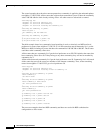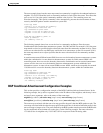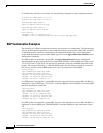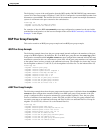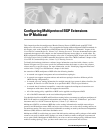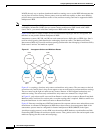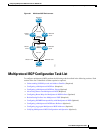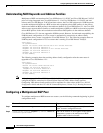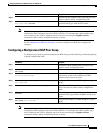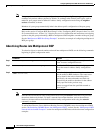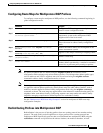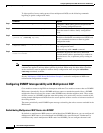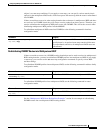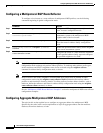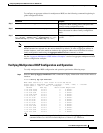
Configuring Multiprotocol BGP Extensions for IP Multicast
Multiprotocol BGP Configuration Task List
IPC-350
Cisco IOS IP Configuration Guide
Understanding NLRI Keywords and Address Families
Multiprotocol BGP was introduced in Cisco IOS Release 11.1(20)CC and Cisco IOS Release 12.0(2)S
prior to it being integrated into Cisco IOS Release 12.1. In Cisco IOS Release 11.1(20)CC and later
releases and Cisco IOS Release 12.0(2)S and later releases, the Cisco IOS software uses NLRI keywords
to enable multiprotocol BGP over a BGP session and to populate unicast BGP prefixes in the unicast
database and multicast BGP prefixes in the multicast database. In Cisco IOS Release 12.1, the Cisco IOS
software uses separate address families to enable multiprotocol BGP over a BGP session and to populate
unicast BGP prefixes in the unicast database and multicast BGP prefixes in the multicast database.
Cisco IOS Release 12.1 does not support the NLRI keywords. However, for backward compatibility, the
NLRI keyword configuration of a Cisco router is automatically converted to an address family
configuration when a router is upgraded to Cisco IOS Release 12.1. The following example shows an
NLRI keyword configuration for a Cisco router that is running Cisco IOS Release 12.0(8)S:
router bgp 5
no synchronization
network 172.16.214.0 mask 255.255.255.0 nlri unicast multicast
neighbor 172.16.214.34 remote-as 5
neighbor 172.16.214.38 remote-as 2 nlri unicast multicast
neighbor 172.16.214.42 remote-as 5
neighbor 172.16.214.59 remote-as 5
no auto-summary
The following example shows the resulting address family configuration after the same router is
upgraded to Cisco IOS Release 12.1:
router bgp 5
no synchronization
network 172.16.214.0 mask 255.255.255.0
neighbor 172.16.214.34 remote-as 5
neighbor 172.16.214.38 remote-as 2
neighbor 172.16.214.42 remote-as 5
neighbor 172.16.214.59 remote-as 5
no auto-summary
Note Although supported in Cisco IOS Release 12.1, the following sections do not explain how to
configure the BGP-4 extensions for Virtual Private Network (VPN) address family prefixes.
Configuring VPN address family prefixes will be explained in a later release of the Cisco IOS IP
Configuration Guide and the Cisco IOS IP Command Reference, Volume 2 of 3: Routing Protocols.
Configuring a Multiprotocol BGP Peer
To configure multiprotocol BGP between two routers, use the following commands beginning in global
configuration mode:
Command Purpose
Step 1
Router(config)# router bgp autonomous-system
Configures a BGP routing process and places the
router in router configuration mode.
Step 2
Router(config-router)# neighbor ip-address remote-as
autonomous-system-number
Adds the IP address of the neighbor in the remote
autonomous system to the multiprotocol BGP
neighbor table of the local router.



